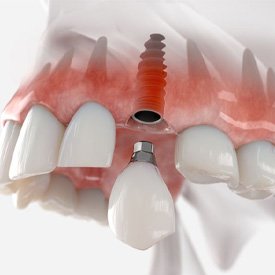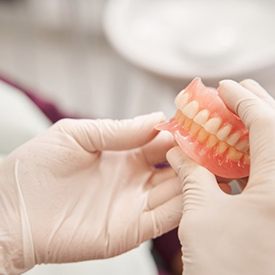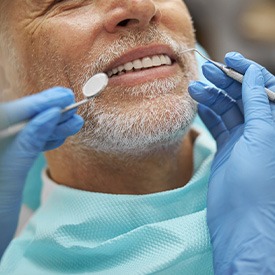Dentures – Arnold, MO
Easy, Affordable Tooth Replacement
JL Dental knows that choosing the right tooth replacement method is important. Everyone is different, and various factors including oral health, bone density, budget, and age all weigh into the decision. That’s why we offer various ways to replace your missing teeth at our Arnold, MO dental practice. Drs. Jonathan and Laura Mears are well-trained family dentists who are committed to helping patients of every age and stage of oral health find the dental care they need, and one way we do this is by offering dentures and partials. Whether you’re missing all of your teeth along an arch or need to replace just a few teeth, JL Dental can provide a dental prosthetic that will fit comfortably and return your smile to excellent function.
Who Is a Good Candidate for Dentures?

Dentures are a suitable treatment option for most people who have suffered the loss of multiple teeth. They can help you to eat more easily, smile with confidence, and more! Of course, when you visit us for a consultation, we will examine your mouth to ensure that it is healthy enough to support dentures. Based on your circumstances, we will recommend a custom treatment plan to replace your lost teeth and get you on the road to improved oral health.
Effects of Missing Teeth

Missing teeth can be the result of numerous circumstances. For example, you might have had advanced gum disease or been in a traumatic accident. Genetics and lifestyle choices can also play a role in tooth loss.
Regardless of why you have an incomplete set of teeth, your condition may cause some difficulties for you on a daily basis. You might hesitate to smile due to feelings of self-consciousness about your appearance, and you may find it difficult to eat a variety of nutritious foods. You could even struggle to enunciate certain sounds. Fortunately, dentures may be able to help you cope with such challenges and enjoy an improved quality of life.
What Qualifies You for Dentures?

You may be a suitable candidate for dentures if:
- You have lost all or most of your teeth in either your upper or lower dental arch (or both). If you are missing only a few teeth, a different tooth replacement option might be better for you.
- You are looking for a cost-effective way to rebuild your smile.
- Your jawbone and gums are healthy enough to support a prosthetic. If they are not currently up to the task, you may become a candidate for dentures after some preliminary restorative treatment.
Alternative Tooth Replacement Options

If dentures are not quite right for you, you might qualify for an alternative form of tooth replacement, such as:
- A fixed bridge. A fixed bridge has two crowns, which get attached to the teeth that surround an empty space. An artificial tooth “bridges” the gap between them. Fixed bridges are both durable and aesthetically pleasing, and the treatment process is relatively fast.
- Dental implants. Dental implants are prosthetic tooth roots that can support crowns, bridges, and dentures. Due to their stability, longevity, and many other benefits, we often recommend them as the best form of tooth replacement for qualifying patients.
The Different Types of Dentures

A denture can be used to restore your ability to smile, talk, and chew with confidence after tooth loss. No matter how many teeth you’re missing, there’s a type of denture out there for you. The three main kinds of dentures we offer are:
- Full dentures: These replace an entire arch of missing teeth at once. This full arch of prosthetic teeth is attached to a pink acrylic base, sitting directly on the gums and remaining in place with natural suction or a bit of denture adhesive.
- Partial dentures: These are used to fill the gaps in your grin if you still have some teeth left. By attaching to your natural teeth with metal clasps, it fits within your smile like a missing puzzle piece.
- Implant-retained dentures. A full or partial denture can be secured by dental implants placed directly in the jawbone to maximize stability and strength.
How Dentures Are Made

If you’re looking to replace your missing teeth with dentures, the first step is to schedule a consultation with either Dr. Jonathan or Laura Mears. We’ll discuss your options for tooth replacement, and if we decide you’re a good candidate for dentures, we can move forward with the process of creating them. Read on to learn about the materials used to make your prosthetics and how they’re made.
What Are Dentures Made Of?

Dentures generally come in two parts: the base and the teeth. Here’s a brief look at both components:
- Denture Base: This is the structure that will support the artificial teeth, which will normally be designed to stick to your gums via natural suction. The base can be constructed out of materials like acrylic, nylon, resin, porcelain, or even metal (such as with partial dentures and the metal clips with an acrylic base). The base of full dentures is typically made out of acrylic to match the gum tissue.
- Artificial Teeth: The pearly whites atop the base will usually be made from resin or porcelain because of their ability to match natural tooth enamel. However, porcelain is the more popular option because of its durability and longevity. This material is also mostly reserved for full dentures, as it can be too abrasive against natural teeth.
The Denture Creation Process

Your prosthetics will require a multi-step process involving the following:
- Your dentist will take impressions of your upper and lower gums to make a plaster model of your mouth. The replica will be used to ensure your dentures are properly sized and shaped, which will then be sent to a dental lab to create a wax version of your gum line.
- Artificial teeth will be placed in the wax model using an articulator before making minor adjustments to shape and carve the material so that it matches your gums perfectly.
- The wax dentures will be sent to us for a fitting. If approved, we’ll send them back to the lab for completion. You’ll be given temporary dentures to wear while you wait.
- Back at the lab, the technician will boil the dentures to remove the wax by putting it in a flask. A plaster will be poured into it to maintain the denture’s shape before placing the entire flask into hot water to melt the dentures.
- Holes will be made in the teeth so the material can attach to them. A liquid separator will be added to the plaster layer to prevent the acrylic from sticking to it. They’ll then inject acrylic into the flask to replace the wax.
- The plaster will be removed with special lab tools to reveal the final dentures. They’ll then be placed in an ultrasonic bath to get rid of any lingering plaster.
- Excess acrylic will be removed from the dentures before they’re trimmed and polished.
- Once ready, the dentures will be sent to us for a final fitting. We’ll make any minor adjustments necessary to make sure your prosthetics fit you perfectly and comfortably.
Adjusting to Your New Dentures

Soreness is one of the typical symptoms after receiving your new dentures, but this should go away after some time. Take over-the-counter pain relievers if necessary to help reduce discomfort while you get used to wearing your prosthetics. Make sure to stick to soft foods, exercise your facial muscles, and use an adhesive to make your adjustment period go smoother. Notify our team if you notice any strange or uncomfortable symptoms so we can make adjustments.
The Benefits of Dentures

Spaces in your smile left behind by missing teeth can potentially negatively affect your daily life in several ways. For example, you might struggle to eat or speak confidently, or worry that you’ll be judged for the changes in your appearance.
Thankfully, our team in Arnold can provide lifelike dentures to restore your smile and boost your confidence, regardless of how many natural teeth you have left. Continue reading to learn more about the different advantages of this versatile treatment to help decide whether it’s right for you!
Psychological Benefits

Your teeth are essential in your ability to eat, speak, and smile, and it’s normal to feel self-conscious when some or all of them are lost. You might even develop anxiety or depression if you’re overly afraid of what others might think.
Fortunately, our team can provide lifelike dentures designed to look as natural as possible. Wearing your new restorations can boost your confidence because you’ll feel like your most attractive self.
Clearer Enunciation

You rely on two complete arches to enunciate different sounds correctly, and gaps in your grin can cause speech impediments, such as a lisp or slur, that make communication challenging.
Dentures function like artificial teeth so that you can speak more normally. It might take about a month for your tongue and the other supporting muscles in your mouth to adjust to their presence, but with patience and practice, you can overcome the changes to your speaking patterns.
Improves Nutrition

Many healthy foods rich in nutrients that support your well-being, such as lean meats or raw fruits and vegetables, can be incredibly hard to bite into and chew without a full set of teeth. Eating overly large pieces can contribute to gastrointestinal issues, and you could develop malnutrition by sticking to less wholesome soft foods, like pasta.
Your new teeth return a portion of your original bite force so that you can enjoy a wider variety of ingredients to boost your oral and overall health.
Preserves Oral Health

Any natural teeth remaining are prone to drifting out of alignment to fill in the empty spaces, which can harm your oral health. For example, it can wear down your enamel unevenly or prematurely, increasing the risk of damage or decay.
Meanwhile, wearing dentures helps ensure that everything remains in its proper place while simultaneously distributing your bite force more evenly throughout your mouth.
Expands Opportunities

Did you know that, according to a 2019 study, having dental problems is negatively associated with the probability of being employed? The status of your smile can communicate a lot about you, and you might not make a favorable impression with gaps in your grin.
Rebuilding your smile with dentures can improve your self-esteem, which in turn contributes to better professional achievements, more meaningful relationships, and an engaging social calendar.
Tips for Living with New Dentures

It can take a few weeks for your mouth to grow accustomed to your dentures, so a little tenderness in the beginning is normal. Keep wearing them as much as possible, except at night. Try cutting your food into bite-sized chunks and work your way back up to normal bites. Practice reading aloud with them in to help you get used to speaking with them.
Maintenance is actually quite easy. Brush them with a soft-bristled toothbrush but no toothpaste every day. Let them soak in a denture cleanser overnight. Just don’t forget to rinse them off before putting them back in in the morning!
Contact JL Dental in Arnold, MO to discuss your options for tooth replacement and begin the process of regaining your smile. Missing teeth can lead to all kinds of other problems -- don’t let them go unaddressed.
Denture FAQs

If you’re missing teeth, dentures offer a quick and comfortable way to restore your pearly whites! Thanks to the latest dental technology and high-quality materials, full and partial dentures are more lifelike and reliable than ever. For your convenience, we’ve gathered some of the most common questions we get about this classic tooth replacement option below. If you don’t see the answer you’re looking for, don’t hesitate to call us and we’ll be more than happy to help!
I Need Dentures—Where Do I Start?
Your journey towards a complete, confident smile starts with a consultation with Drs. Jonathan and Laura Mears. At this first appointment, they’ll take the time to fully understand your smile goals and concerns. Then, they’ll review your medical history, inspect your oral health, and explain which treatments they recommend for you.
Do I Brush My Dentures Like Natural Teeth?
Your dentures may look like natural teeth, but they are cared for in a slightly different manner. Regular toothbrushes and toothpastes shouldn’t be used to clean your dentures because they’re too abrasive and can scratch your dentures. Instead, clean them off every morning, evening, and between meals by rinsing them off and using special denture brushes and cleaners. Another important part of caring for your dentures is to soak them every night. Soaking cleans away harmful particles from every nook and cranny of your dentures while giving your gums a rest.
How Long Will My Dentures Last?
As your mouth naturally changes shape over time, your dentures will begin to lose their snug fit. Eventually, they may begin to feel loose or uncomfortable. You’ll typically need to replace your dentures every seven to ten years to keep you and your smile healthy.
However, if you’re looking for a longer-lasting tooth replacement option, you may want to consider implant-retained dentures. These dentures are held in place with a modern tooth replacement treatment called dental implants. By strategically placing several small titanium posts into your jawbone, we can anchor your full or partial dentures into place as if they’re a natural part of your smile! Replacing a missing tooth both above and below the gumline offers unmatched functionality, comfort, and longevity. In fact, with the proper care, you can easily expect your implant-retained denture to last a lifetime!
Can I Eat Normally with Dentures?
While dentures can restore the appearance of your pearly whites right away, they do take some getting used to. Eventually, you’ll be able to comfortably and easily enjoy most of your favorite foods while wearing your dentures, but it will require some time and practice. Over the first several weeks of wearing your new dentures, stick to taking small bites of soft foods. As you begin to feel more comfortable, you can progress to crunchier, tougher foods. While this process takes a different amount of time for everyone, many patients feel very comfortable eating with their dentures after a month of practice.
Does Dental Insurance Cover the Cost of Dentures?
Every dental insurance policy is different. Feel free to call us or bring your policy paperwork with you to your consultation and we’ll be more than happy to help. We accept a wide range of dental insurances and have years of experience maximizing our patients’ benefits to provide the most cost-effective care. If your insurance doesn’t cover dentures, or if you don’t have dental insurance, we also are happy to accept CareCredit and CitiHealth Card. These third-party financing options can help break down the cost of your treatment into smaller payments that fit into your budget.
